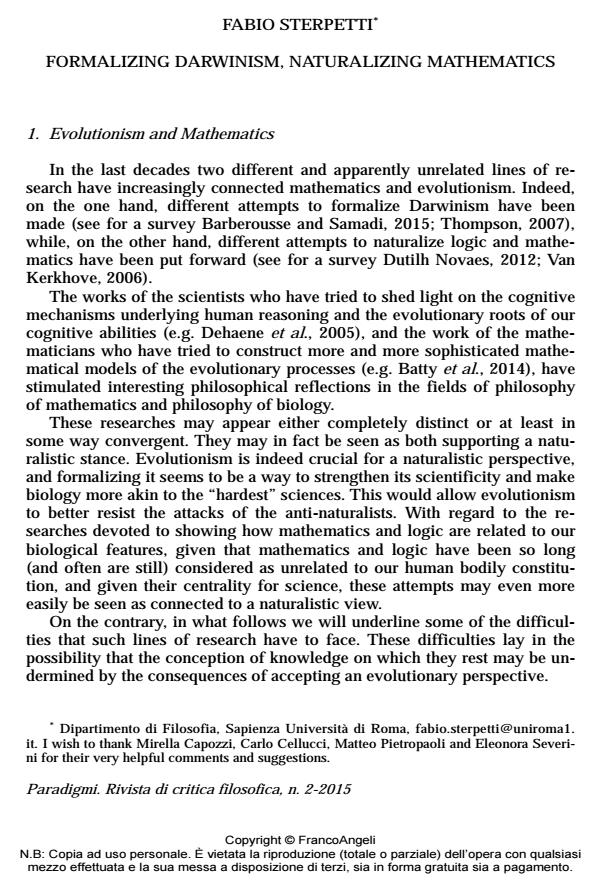FORMALIZING DARWINISM, NATURALIZING MATHEMATICS
Titolo Rivista PARADIGMI
Autori/Curatori Fabio Sterpetti
Anno di pubblicazione 2015 Fascicolo 2015/2
Lingua Italiano Numero pagine 28 P. 133-160 Dimensione file 125 KB
DOI 10.3280/PARA2015-002009
Il DOI è il codice a barre della proprietà intellettuale: per saperne di più
clicca qui
Qui sotto puoi vedere in anteprima la prima pagina di questo articolo.
Se questo articolo ti interessa, lo puoi acquistare (e scaricare in formato pdf) seguendo le facili indicazioni per acquistare il download credit. Acquista Download Credits per scaricare questo Articolo in formato PDF

FrancoAngeli è membro della Publishers International Linking Association, Inc (PILA)associazione indipendente e non profit per facilitare (attraverso i servizi tecnologici implementati da CrossRef.org) l’accesso degli studiosi ai contenuti digitali nelle pubblicazioni professionali e scientifiche
Negli ultimi decenni due diverse e apparentemente non correlate linee di ricerca hanno connesso sempre di più la matematica e l’evoluzionismo. Infatti, da una parte si sono avuti diversi tentativi di formalizzare il darwinismo mentre dall’altra diversi tentativi di naturalizzare la logica e la matematica sono stati posti in essere. Tali ricerche possono apparire o completamente indipendenti, oppure convergenti. Possono in effetti sembrare supportare entrambe una concezione naturalistica. L’evoluzionismo è infatti cruciale per una visione naturalistica e formalizzarlo sembra essere un modo per rafforzare la sua scientificità. Al contrario, si metterà in luce come tali linee di ricerca possono essere viste come contrastanti, dato che la concezione della conoscenza cui si rifanno può essere messa in discussione dalla adozione di una prospettiva evoluzionistica.
Parole chiave:Conoscenza, matematica, naturalismo, realismo scientifico, verità.
Fabio Sterpetti, FORMALIZING DARWINISM, NATURALIZING MATHEMATICS in "PARADIGMI" 2/2015, pp 133-160, DOI: 10.3280/PARA2015-002009